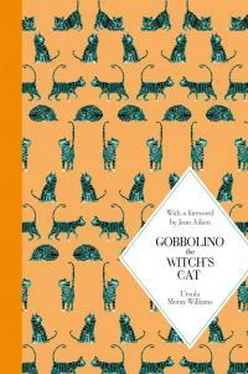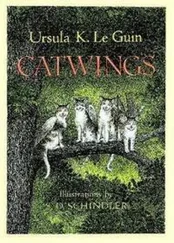“Well, no matter,” said the pedlar-woman, walking towards the door. “Perhaps your grandfather will give you another silver coin if you ask him prettily.”
“But you will be gone by then!” wept the girl.
“Three miles on, through the forest, there is a tinker’s hut,” said the pedlar-woman. “There you can find me for the next three nights. Goodbye, my daughter.”
But when the woodcutter came home, not all his granddaughter’s tears and prayers could win another silver coin from him.
When he found out that she had let the pedlar-woman go he was very angry.
“What? You refused a red or a green gown for the sake of a gold one you could not buy? Shame on you! What is one colour more than another? Now the pedlar-woman is gone, and you will have to wait for your dress until she comes back again.”
The next day the woodcutter’s granddaughter sulked all day long. She burned the cakes, left the pots dirty, and threw a frying pan at Gobbolino.
When her grandfather came home in the evening she begged him again to give her a silver coin, but he would not listen to her.
The next day she would not eat a thing from dawn till dark, but still he would have nothing to say when he came home to his tea.
The next day she spent weeping and walking up and down the floor, for it was the third day, and by evening the pedlar-woman would be gone.
She clenched her hands and stamped on the floor, while Gobbolino trembled in a corner, for whenever she caught sight of him she exclaimed:
“Don’t look at me like that! How dare you cast your dreadful blue eyes upon me when you have brought me to such misery! It is all your fault, I tell you, all your fault!”
But all of a sudden in the early evening her manner changed, and her unkindness towards Gobbolino turned to tenderness and compassion.
With her own hands she poured him out a saucer of cream and stood watching him drink it, murmuring:
“Beautiful Gobbolino! How handsome you are! What a shining coat you have, and what beautiful blue eyes! When you have finished your milk, Gobbolino, I have a piece of liver for you, and I believe in my drawer I have a little velvet bag that will make you a bed.”
Gobbolino purred with gratitude, for the last three days had been very uncomfortable for him, and he had been very frightened of the girl’s ill temper and the saucepans and frying pans that she flung at him.
“But how wrong I was to think her a shrew!” he said as he lapped the cream. “How wrong and how unkind! It comes of being born a witch’s kitten, I suppose. I see the bad in other people that is in myself. The girl is young and her disappointment upset her. Her true nature is tender and bright, and how good she is to me!”
He could hear the woodcutter’s granddaughter singing in her bedroom as she looked for her little velvet bag.
“Look at this, Gobbolino!” she cried as she ran into the kitchen. “Isn’t this a handsome bed for you? And see! Here is a little piece of liver to go inside it, to give you pleasant dreams!”
“I thank you, dear mistress! It will make me a beautiful bed!” said Gobbolino gratefully. “But I see the sun is going down, and I must hurry off to meet my master, your grandfather.”
“How ungrateful you are!” said the girl, with tears of vexation in her eyes. “Here I have given you my velvet bag for a bed and you won’t even try it first!”
Gobbolino was ashamed of his carelessness when he saw how he had offended his young mistress.
“Well, I will just pop in and out again!” said he. “But I am quite sure there is no need to doubt the comfort of such an elegant bag, dear mistress.”
But the girl still insisted that Gobbolino should try it for himself, so to please her he hopped inside at once.
The moment he had done so the deceitful girl drew the strings tightly, so that the mouth of the bag was closed, and he was a prisoner.
“Ha! Ha! Ha!” laughed the woodcutter’s granddaughter, swinging the bag by the string. “Now you are in my power. You wicked, tiresome little cat that has brought me nothing but trouble! Now I can have my gold dress! I shall give you to the witch along with my silver piece, and I hope I may never see you again!”
“Oh, my goodness!” exclaimed Gobbolino, as the girl snatched up her bonnet and ran away through the forest swinging the velvet bag. “That I should come to this! Whatever will my master, your grandfather, say?”
“I shall tell him you ran away of your own accord!” replied the girl. “He will not find out the truth in a hurry, and the pedlar-woman will never let you go. You are going back to the place where you belong – Gobbolino the witch’s cat!”
Large tears filled Gobbolino’s eyes and splashed upon his shirt front as the bag swung to and fro.
The woodcutter’s granddaughter was running very fast, for she was afraid the pedlar-woman would be gone, and then what was she to do for her gold dress? She was afraid too to be out after dark, and there were three miles to walk home when she had parted with Gobbolino.
“I will tell my grandfather I was searching for his cat,” she said to herself as she hurried along, and at last the tinker’s hut came in sight.
The old pedlar-woman was just on the point of departing. She was loading her wares on the back of the donkey standing before the door.
“Ho! Ho! Ho!” she croaked as the woodcutter’s granddaughter arrived, quite out of breath with her haste. “I knew you were coming! Psst! I heard you put the cat in the bag! Bang! I heard you slam the door! Pat-a-pat! Pat-a-pat! I heard you running through the forest to meet me. You thought the old pedlar-woman would be gone!”
“Then you are a witch! I thought as much!” said the girl boldly. “Well, I have brought you a witch’s cat! Don’t let him escape, I beg of you, for if my grandfather once finds out what has happened he will turn me out of the house. Here is the cat, and here is my silver coin. Where is my gold dress?”
The pedlar-woman took the silver piece in one hand and the velvet bag in the other. She slipped the coin into her bodice, and hung the bag on the donkey’s saddle.
Then she bundled up the gold material, and the woodcutter’s granddaughter was so busy exclaiming over it and over all the other materials that it was almost dark when she turned to go home.
“Won’t you come part of the way with me, mistress?” she asked the pedlar-woman.
“Indeed, my daughter, my way lies in the opposite direction,” said the old woman. “I must be well on my journey by the time the moon rises.”
“It is so far to go alone!” said the girl, clutching her roll of gold satin and peering among the trees.
“There is your little cat!” said the pedlar-woman with a malevolent smile. “You can take him back with you and give me back the dress.”
“Oh, no! No! No!” cried the girl, running away through the trees as fast as her legs would carry her.
She ran so fast and so far she mistook her way and lost the path. Soon she was floundering waist-deep in brambles that clutched at her frock and tore great rents in the beautiful gold material that she carried.
She had no time to stop and cry about this, she was so far from home, and when she tried to find the path she fell into a swamp and nearly drowned herself. When she struggled out again the mud had stained the beautiful gold stuff black, and the woodcutter’s granddaughter was soaked to the skin.
The moon rose, but shed no light into the inky forest; the stars twinkled, but hid their faces behind the dancing branches of the trees.
Small twigs reached out to scratch at her, twisted roots tripped her up, and the beautiful gold satin she had bought from the pedlar-woman had become a handful of muddy shreds.
Читать дальше











